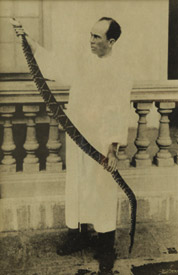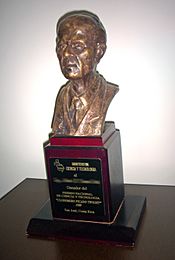Clodomiro Picado Twight facts for kids
Quick facts for kids
Clodomiro Picado
|
|
|---|---|
 |
|
| Born | April 17, 1887 |
| Died | May 16, 1944 |
| Nationality | Costa Rican |
| Alma mater | La Sorbonne, Paris |
Clodomiro Picado Twight (born April 17, 1887 – died May 16, 1944) was a famous scientist from Costa Rica. People also called him "Clorito Picado." He was known around the world for his important work on snake venom. He also helped create many different antivenoms.
Dr. Picado's studies on molds were very important. They happened before Alexander Fleming officially discovered penicillin. Picado even used compounds from molds to treat patients. This was at least a year before Fleming's discovery. He wrote more than 115 scientific papers and books.
Contents
Clodomiro Picado's Life Story
Growing Up and Studying
Clodomiro Picado was born in April 1887. His birthplace was San Marcos, Nicaragua. His parents, Clodomiro Picado Lara and Carlota Twight Dengo, were both Costa Rican citizens.
In 1890, when Clodomiro was just two years old, his family moved to Cartago, Costa Rica. He went to San Luis Gonzaga high school. He finished school in 1906. Because he was an excellent student, he received a special scholarship. This allowed him to study in France.
He studied at the University of the Sorbonne in Paris. In 1909, he earned his diploma in Zoology. He returned to Costa Rica in 1910. But he soon left again to continue his studies. He later earned another diploma in advanced Botany.
In 1913, Picado earned his Doctor of Science degree. That same year, he joined the famous Pasteur Institute in Paris. In 1915, he published a medical magazine in Costa Rica called "Anales del Hospital de San José".
His Passing
Dr. Picado passed away in 1944 after an illness. The Costa Rican Congress honored him greatly. They declared him "Meritorious of the Motherland." This special title was given to him in December 1943.
Amazing Discoveries and Research
Dr. Picado's scientific work was huge and very detailed. It is believed he wrote about 115 research papers. He studied almost everything around him. This included soil, plants, animals, human body parts, and water. He wrote many books and special reports.
His work covered many different fields. These included zoology (the study of animals) and botany (the study of plants). He also studied bromeliads, which are unique plants. He researched ophidism (snakebites) and how plants get sick (phytopathology). He also worked in industrial microbiology and medical microbiology. He made important discoveries in immunology, which is the study of how our bodies fight off diseases.
Penicillin and Bacteria
In March 2000, doctors in San José published some of Picado's old notes. These notes showed his work from 1915 to 1927. He wrote about how certain fungi, from the Penicillium genus, stopped bacteria from growing. These bacteria were Staphylococci and Streptococci. These bacteria can cause many infections.
In 1927, he clearly showed that Penicillium fungi could stop these bacteria. Even though Alexander Fleming is known for discovering penicillin, Picado's old lab notebooks from 1923 show his own findings. These notes show that he observed the antibiotic action of Penicillium sp.
Because of this, Dr. Picado is seen as one of the first scientists to work with penicillin. He published a report about his treatments with penicillin in 1927. This report was shared by the Biology Society of Paris.
Awards and Special Recognition
To remember Dr. Picado's amazing scientific work, a special award was created. Since 1977, the Costa Rican Ministry of Science and Technology (MICIT) gives out the "Clodomiro Picado Twight" National Award. This award encourages and recognizes great scientific and technological work by Costa Rican citizens.
In 2000, the award was changed. A year later, it was split into two parts:
- National Award of Science "Clodomiro Picado Twight"
- National Award of Technology "Clodomiro Picado Twight"
Both awards are given every year. Winners receive a special statuette of Dr. Picado. They also get a special paper and money.
Dr. Picado's picture was also put on the 2,000 colónes banknote in Costa Rica.
In 2000, Picado's daughter-in-law, Lolita González Picado, accepted a Gold Medal for him. This award was given after his death by the World Intellectual Property Organization (WIPO).
Many places in Costa Rica are named after Dr. Picado:
- The Clodomiro Picado Research Institute is in Dulce Nombre de Jesús. It was started in 1970. This institute is part of the University of Costa Rica. It makes snake antivenom. It also does scientific research on snakes and their venoms. The institute helps educate people in rural areas and hospitals.
- Clodomiro Picado Twight High School, also known as I.E.T., is in Turrialba.
- The Clodomiro Picado Medical Clinic is in Cinco Esquinas.
- The Clodomiro Picado Twight Auditorium is at the National University.
A type of venomous snake from Central America is also named in his honor. It is called Atropoides picadoi.
See also
 In Spanish: Clodomiro Picado Twight para niños
In Spanish: Clodomiro Picado Twight para niños


